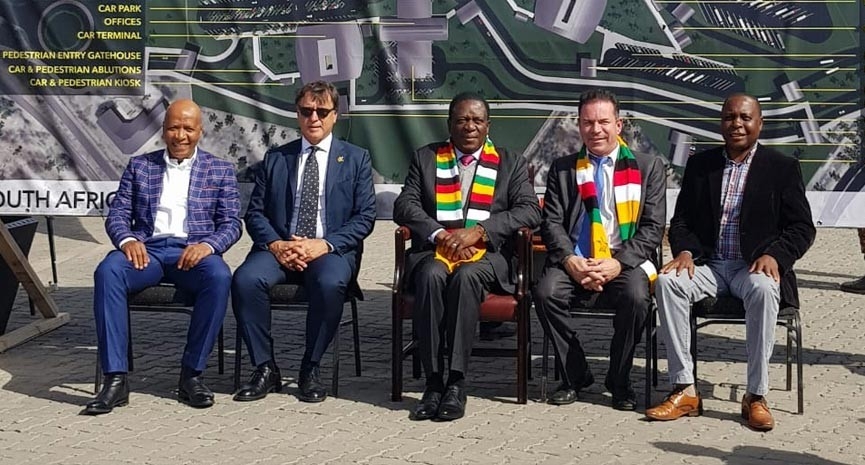
Tariro Mapfiro THE government of Zimbabwe entered a partnership with Zimborders Consortium, which won the concessionaire tender to upgrade and modernise the Beitbridge border post through a public-private partnership arrangement.
The programme is being conducted based on a 17-year build-operate-transfer concession between the Zimborders Consortium and the government.
The terms of the partnership are that Zimborders will administer and maintain the infrastructure for the term of the concession, earning a return on investment via border toll payments. Under the modernisation project, the scope of work includes but is not limited to a full upgrade of the border terminals comprising a freight terminal, roadways, and ICT facility upgrades, a bus terminal, a light vehicle terminal, and out-of-port works.
Most of the works have already been completed. In addition, the non-scope works include but are not limited to developing staff residential building units, housing sewer lines, housing electrical supply lines, a reservoir, water pipelines, a wastewater treatment plant, a water pump station, and other infrastructure.
The upgrade also includes the procurement of technical and software, thus modernising the border post to ensure smooth service during the concession period.
It is believed that after the completion of the modernisation project, the border post is expected to transport five times its present anticipated monthly capacity of 600 000 passengers, 30 000 commercial trucks, 15 000 buses, and 120 000 light vehicles.
Furthermore, the upgraded facilities are expected to result in increased border efficiency systems and infrastructure as it is being constructed to suit the proposed One-Stop-Border-Post between Zimbabwe and South Africa.
This comes as a relief as in recent years, infrastructure deficiencies, among other things, have been identified as a key impediment to the complete implementation of the one-stop idea.
- Chamisa under fire over US$120K donation
- Mavhunga puts DeMbare into Chibuku quarterfinals
- Pension funds bet on Cabora Bassa oilfields
- Councils defy govt fire tender directive
Keep Reading
Though the face of the border is significantly improving as the government’s mega-project to transform the border into a world-class commercial hub is becoming a reality, there still is a lot of work that needs to be done to enable the facilitation of effective and efficient services to the clients that make use of the border.
The World Trade Organisation’s (WTO) Doha Development Agenda, adopted during the Hong Kong Ministerial Conference, commits its members to take “additional measures to provide effective market access, both at the border and otherwise.”
The Addis Ababa Action Agenda further states that the “improvement of trade- and transit-related logistics” to facilitate transport and trade, especially for landlocked developing countries is needed.
Good border management, therefore, serves a dual purpose, helping to balance the states’ interests in both facilitating cross-border movements and maintaining security.
Conscious of the implications of ineffective and inefficient border management structures, the government should therefore continue to invest in border management reform, and in enhancing capacity in terms of border and migration management structures and procedures.
Border management, whilst ensuring security is not compromised, must also facilitate legitimate trade and travel. Recognising that trade is an important element contributing to the social and economic development of the nation as a whole, the relevant authorities must strive to introduce a sound border management system that can strike the balance between the encouragement and facilitation of physical movement of persons and goods across the border.
Effective border management systems, therefore, must recognise that facilitation and control are two equally important objectives that must be addressed at the same time.
The traditional form of our Zimbabwean borders is that there are numerous public bodies involved in border management tasks, including, amongst others, customs officials, security agencies, health, agriculture and defence officials, and the recently introduced Zimborders officials at Beitbridge border post.
This setup thus makes the attainment of an effective border management system almost impossible to exist. The presence of numerous public bodies makes the border processes weighty and confusing for most clients due to the unintegrated requirements of the many agencies.
Border operations are affected by these inefficiencies, which in turn affect cross-border transport movements and trade flow. The high number of stakeholders operating at border posts leads to significant levels of bureaucracy and duplications, which contribute to border inefficiencies.
As in most countries, the major task of the Customs Services at the border is the levy and collection of import and export duties and taxes, including the control over the movement of goods and means of transport to ensure that imports and exports comply with the rules and regulations established by the government.
Customs services can also be subcontracted by other agencies to collect payments on their behalf. As a result of the complex nature of the requirement of many agencies at the border, interagency cooperation and coordination is required to ensure a safe and efficient border management. The presence of the various public entities at the border post rather than bringing or safeguarding trade and security seems to be causing a lot of inefficiencies in our border management systems.
Border posts are one of the most important nodes whose performance has a significant bearing on corridor performance, the efficiency of supply chains, and trade competitiveness. There is, therefore, a need for an immediate introduction of an Integrated Border Management (IBM) system to ensure that the services offered by border agencies are in tandem with the improved infrastructure.
The introduction of an Integrated Border Management concept will go a long way towards meeting the national aspiration of ensuring both border security and facilitation. The establishment of an IBM requires both intra-agency coordination and inter-agency collaboration. The objective of such should strike the balance between rule-based control and trade facilitation of cross-border traffic, in particular, the movement of goods and means of transport. Though the upgrade of the border has addressed some of the challenges that have been noted in previous years, such as improved infrastructures and road networks among others, there is still a need to maintain the balance between the two major requirements at the border, namely, national security and trade facilitation.
More enhancement measures, such as inter-agency coordination and collaboration, simplification and harmonisation of processes and procedures related to means of transportation and/or the drivers, development of intelligence, and effective exchange of information both within and without the agencies concerned are still needed. Of equal significance as mentioned above, close cooperation and coordination between neighbouring border agencies will also be a key factor.
Cooperation and coordination can also come in particular, through the provision of information to assist the agencies responsible for border management in the fulfilment of their effective and efficient service provision capability.
Besides ensuring that border security is not compromised, effective border management can generate monetary and non-monetary benefits for the business community and result in the furtherance of legitimate trade. The benefits may include amongst others, saving of compliance costs, arising from simplification and harmonisation of processes, procedures, and formalities; saving of costs for services related to transportation, and saving of time arising from the expeditious border and customs clearance, inspections, and other forms of frontier control.
- Mapfiro is an economist. These weekly New Horizon articles published in the Zimbabwe Independent are coordinated by Lovemore Kadenge, an independent consultant, past president of the Zimbabwe Economics Society (ZES) and past president of the Chartered Governance & Accountancy Institute in Zimbabwe (CGI Zimbabwe). — [email protected] and mobile No. +263 772 382 852.










